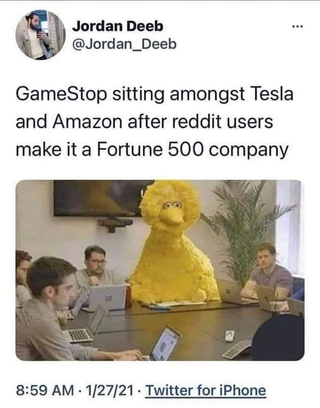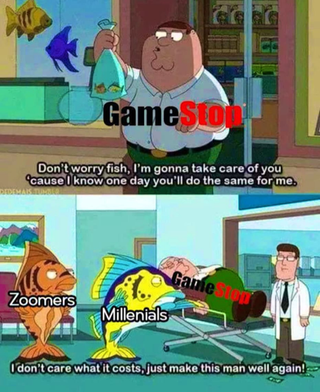
Now would you look at that, it’s the roaring 20s. Buckle up because meme history is in the making as we speak. But before we dive in, let’s backtrack a little to the culprit of it all – the origin of the meme.
While the concept of memes has been around for decades, it wasn’t until the social media boom of the 2000s that internet memes began to take on a new shape and meaning. What was once just a simple photo with a caption began shifting into a cultural phenomenon that would slowly define a grand part of Gen Z. With the years passing, the people of the internet would come to realize the potential in their collectiveness – that when united as one, the world would have to listen to what they had to say.
With all the chaos going on in the boomer-led adult world, the internet is the place to laugh in pain.
Many internet historians agree that on the faithful afternoon of May 28, 2016 the online world witnessed a turning point; no longer would it be defined by fun challenges and rage comics. An emotional fuse ignited the raw, absurdist energy from the past decade, and suddenly it became personal. Millions would come together to mourn over the death of a gorilla who was murdered in broad daylight at the Cincinnati Zoo. This event took the internet by storm, practically overnight the world came to know the gorilla’s name: Harambe.
Fast forward to the 2020s – the internet has evolved and its kids have grown up. With all the chaos going on in the boomer-led adult world, the internet is the place to laugh in pain. Many resort to the satirical humor of memes, as they pose a gateway to the absurd, yet funny nature of our current reality no matter how bad it gets.
Even if the world is slowly dying, what’s saying we can’t have a little fun? Well, fun is what the internet did at the start of 2021, as Reddit users on r/wallstreetbets took on the Wall Street Hedge Funds.
To help explain this phenomenon, I’ve decided to break it down the monke way:
In real life, Reddit raised the price by buying absurd amounts of Gamestop stock and call options, thus forcing Wall Street to buy more to compensate for losses.
Let’s say you are monke and you really like banana. Monke thinks price of banana will go up from $5 to $10 next month. Monke can either buy banana from his brother George, or instead monke can buy what is called a call option from his other brother John for $1. By buying a call option, John gives monke a piece of (digital) paper called a contract that says monke can buy banana from John for the specific price of $7 on a specific date next month. If monke is right on his hunch, then monke can buy banana from John next month for $7 while the market price is $10. Monke might even sell banana to George for $10 and make a $2 profit. However, if monke is wrong and banana price goes down to $3, monke can choose to not use the contract to buy banana. The only money lost in that case is whatever monke paid for the contract. But the thing is, George can also buy a contract and so can the whole monke neighborhood. In either case, John, aka the outfit, because he doesn’t have that much banana on him, will buy banana for each contract someone buys from him. This helps minimize any loss that might happen if the banana price does go up, but will make John money if the price goes down. So just remember, the more contracts bought, the more banana John has to buy. More banana bought creates a higher demand for banana. Higher demand for banana causes price of banana to go up. In real life, Reddit raised the price by buying absurd amounts of Gamestop stock and call options, thus forcing Wall Street to buy more to compensate for losses.
Now let’s monke-splain short selling. Monke thinks banana will be cheaper next week. Monke decides to borrow banana from his brother George. George has trust issues so he charges monke a small fee and says monke has to return banana next week. So say monke borrows banana while it’s priced at $10 on the market. Monke decides to sell it on the spot but then buys it back next week when banana price has dropped to $6 to return it to George. This results in a $4 profit minus the borrowing fee for monke – all for a banana monke didn’t own in the first place.
Expecting it to go bankrupt, Reddit users trolled and went all in by buying massive amounts of a dying stock, which drove up the demand and caused the price to soar to an all-time high.
The risk of this is if banana goes up in price, as then monke will lose money buying it back for more than he sold it for. The best case scenario is for banana to go bankrupt, meaning banana has suddenly ceased to exist. This would actually be a good thing because then there is no banana left to return to George and monke gets to keep the $4 profit for selling banana. In real life, Wall Street hedge funds bet against Gamestop and short sold it. Expecting it to go bankrupt, Reddit users trolled and went all in by buying massive amounts of a dying stock, which drove up the demand, and caused the price to soar to an all-time high. This resulted in billions of dollars in losses for hedge funds who short sold Gamestop.
Let’s elaborate on the risk of short selling. When monke buys and owns banana, the worst that can happen is for banana to go bankrupt and cease to exist. This would be a 100% loss of your original investment. In the case of short selling, because monke doesn’t own banana, losses can actually surpass 100% of monke’s original investment because the price isn’t set. To give an example, say monke borrowed banana from John and sold it to his neighbor Steve for $5 with the thought that banana would be cheaper next week. Monke was wrong and banana price suddenly rises the following week to $15. Monke must now rebuy banana from someone for $15 so that monke can return banana to John. This results in a 200% loss of $10 for monke. In theory, loss can be infinite because a stock price can go up infinitely high.
The hedge funds are losing billions trying to manipulate and scare people into selling, but this is unsustainable as they will have to eventually cave in and let the stock soar or hope that the people sell.
So to summarize, Wall Street short sold Gamestop thinking it would go bankrupt. However, memers said no and instead bought insane amounts of Gamestop stock and calls, causing the price to skyrocket. Now, Wall Street is playing dirty by having trading apps such as Robinhood limit, if not completely stop people from buying these meme stocks. Combine this with the artificial manipulation of the stock price caused by the hedge funds selling massive amounts of shares in an attempt to drop the price, it all creates a facade of Gamestop going down. It is merely a scare tactic aiming to trick people into selling their shares before the hedge funds have to ultimately rebuy the stock due to their contract. This is why you’ve been seeing the price of the stock undergo such high volatility with its sudden drops and rises – the Hedge Funds are cheating, but the memers are fighting back. “Hold the Line” is the phrase being spammed around because literally all the people have to do to win is hold their position. The hedge funds are losing billions trying to manipulate and scare people into selling, but this is unsustainable as they will have to eventually cave in and let the stock soar or hope that the people sell.


To make matters even weirder, this series of events has attracted massive attention, even seeing Elon Musk, AOC, and Trump Jr. side with the real Wolf of Wall Street, Jordan Belfort, as supporters for the memers. It’s all fair game I say. The hedge funds have been doing this for ages, why not let the people play the free market game? Oh my bad, I forgot it’s socialism whenever the people benefit from anything that the rich do. Silly me.
So I call on all of my fellow internet brothers and sisters. HOLD THE LINE, as this is just the beginning. We will not allow Harambe’s death to be in vain, for we will no longer be pushed by the big guys at Wall Street. The future is now old man. The meme wars are here.
Brian Mendez is .WAV’s Interview Coordinator and a .WAV editorial writer, he wrote the article. Malorie Morello, is a .WAV art contributor, she created the graphic.






Comments